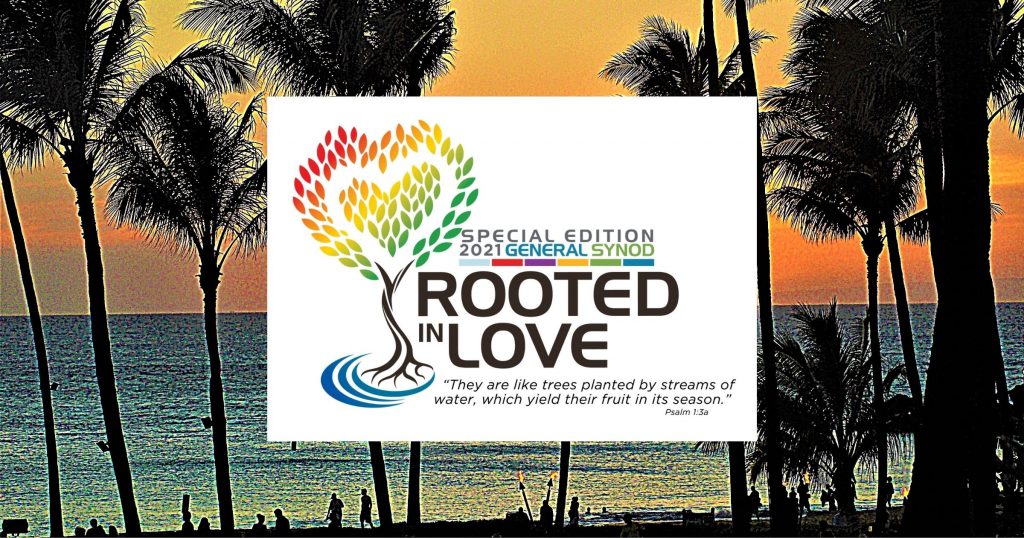Synod changes decision, passes resolution on occupied Hawaii
The governing body of the United Church of Christ doesn’t usually change its mind about a vote it has taken. On July 18, it did.
General Synod delegates voted to reconsider a resolution about Hawaii that they had narrowly defeated the day before. This time the resolution got 72.9 percent approval — comfortably more than the two-thirds required to pass. The vote was 328-122, with 34 abstentions.
The resolution calls on church leaders to ask that the U.S. recognize its own presence in Hawaii as an “illegal occupation” according to international law. On July 17, a majority — but not the needed super-majority — had voted for it.
The resolution had come to Synod from the UCC’s Association of Hawaiian Evangelical Churches, made up of 31 historically Native Hawaiian congregations from across Hawaii. Some 80 percent of them were founded before 1893, the year the United States took Hawaii by military overthrow.
What it calls for
Now that it has passed, the resolution calls for the church’s position to be communicated to government agencies. Specifically, it calls on “the United Church of Christ’s General Counsel’s office to listen to and consider recommendations from the Association of Hawaiian Evangelical Churches, other Native Hawaiian organizations, and Native Hawaiian voices drafting communications to local, national and international leaders and organizations calling for compliance with international humanitarian law and an end to the illegal occupation of the Hawaiian islands.”
AHEC spelled out the case for that position in submitting its resolution months ago.
As amended by delegates in a two-day process at Synod, the resolution also:
- Calls on “all settings of the church … to live into the 1993 apology of the United Church of Christ delivered to the Native Hawaiian people”
- Reaffirms the Synod’s commitment “to stand alongside and in support of the efforts of Native Hawaiians to seek redress and restitution for the war crimes of the U.S. against the Hawaiian Kingdom including, but not limited to, the crime of denationalization”
- Asks for “a written and oral update on the progress on the implementation of this resolution” at the 2023 Synod.
The rethink
The Synod’s rethink followed numerous points of order and points of personal privilege raised by delegates. Several said they felt the July 17 floor debate had been unfairly cut short — though Moderator Penny Lowes pointed out that the delegates themselves had defeated a motion to extend debate in that Saturday session. What succeeded on Jan. 18 — after much parliamentary analysis — was a formal motion to reconsider.
Gloria-Ann Muraki, an AHEC member and a Synod delegate from the UCC Board who spoke to the resolution in committee and on the floor, saw a higher power at work in the process.
She said the AHEC committee that originally wrote the resolution had been meeting since its July 17 defeat. “We have been reminding ourselves that we have to keep our faith in Ke Akua (God),” she said. “And that is what happened on the floor of the General Synod. We thank everyone, and it’s given us renewed faith in the UCC and its process.”
The Rev. Wendell B. Davis, Papa Makua (association minister) of AHEC, issued this statement in response to the July 18 General Synod vote:
Hawai’i’s last ruler was Queen Liliʻuokalani. A prolific composer, our beloved queen created some of the most popular Hawaiian tunes and compositions of all time as she guided her Hawaiian people through crisis. In 1893, the Hawaiian monarchy was overthrown by a group led by U.S. Government Minister John L. Stevens, and as a result, Queen Liliʻuokalani was put under house arrest at the ‘Iolani Palace. During her imprisonment, she composed many pieces of music mourning the treatment of her homeland and people. Best known for her love songs, like “Aloha ‘Oe,” her less popular tunes were quite political. One such song was “Mai Wakinekona a Iolani Hale.” The queen anonymously wrote this song’s lyrics and published them in a weekly Hawaiian language newspaper, subversively messaging how she came to be imprisoned. The following week, someone published a response in song lyrics, “We have heard you, oh heavenly one, our ruler, and we support you.” Queen Liliʻuokalani followed with: “My love for you will never be broken. I will always be grateful for your support.” This anonymous correspondence went on for three months and was eventually set to music in 1895. This heartfelt connection is called, “kūkulu kumuhana.” Kūkulu means “to build.” Kumu referred to a “source” and hana incorporated an activity or work. It was the joining together of a “unified force” to share, express and respond to someone’s need or address a specific circumstance. When we say, “we are with you”, “we support you”, “we are pulling for you” or “we will always be thinking of you”, these phrases describe the essence of kūkulu kumuhana. However, to express its true value and be whole, these phrases must include pule (prayer). Expressions such as, “we are praying for you” is the ultimate representation of kūkulu kumuhana because it always involves the supportive action of each person to incorporate the divine nature of God in providing the kokua (help) we need. Upon reconsideration and the decisive approval of our amended resolution, the Association of Hawaiian Evangelical Churches humbly and gratefully thank the support of our brothers and sisters of the United Church of Christ. Through the significant bond of kūkulu kumuhana and the power of authentic biblical fellowship, God has spoken. With this said, I would like to commend the prayerful and diligent efforts of our Resolution Committee comprised of chairperson, Kalaniakea Wilson, Gloria Pualani Muraki and pastors, Kahu Ron Fujiyoshi and Kahu Kaleo Patterson. As we look ahead, I ask that you once again join us in prayer as God orchestrates and guides our association to renewal, restoration, rebuilding, revival and reclamation. It will also be a time of rediscovery. To heal, unite, forgive, repent and reconcile. Like the tradition of a Hawaiian lei, it is the bringing together of God’s people (nā pua a ke Akua – God’s “flowers”) in unification through the cordage of the Holy Spirit. These are the strands of God’s grace and “aloha” (love). Scripture says, “Whoever lives in love, lives in God and God in them” (1 John 4:15). Love is the key to a solid spiritual foundation.
Related News
Who’s Next?
This week the Supreme Court agreed to oral arguments on the challenges to Presidential...
Read MoreGender and Sexuality Justice Ministries joins global movement to end violence against women, children
The Gender and Sexuality Justice Ministries (GSJM) of the United Church of Christ has joined...
Read MoreUCC and United Church of Canada celebrate a decade of ‘shared mission, mutual accountability, common hope in Christ’
Ten years ago, the United Church of Christ (UCC) and The United Church of Canada (UCCan)...
Read More


